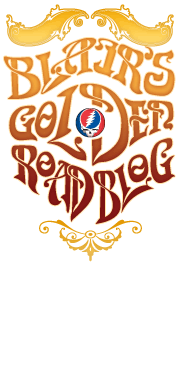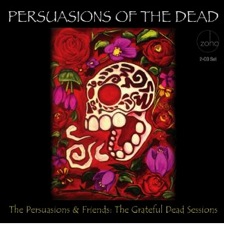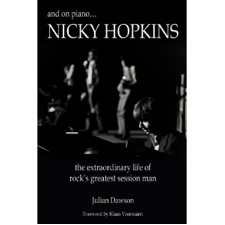This week I’m catching up on some odds and ends.
First up is Persuasions of the Dead, a two-CD set of the great a capella vocal group The Persuasions singing Grateful Dead songs, occasionally joined by various other singers and a handful of musicians. Now, if this sounds familiar, it may be because 11 years ago a CD called Might As Well: The Persuasions Sing Grateful Dead came out. That fine disc, conceived by Rip Rense and co-produced by Grateful Dead Hour host/musician David Gans and Persuasions leader Jerry Lawson, has been out of print since 2002, coincidentally the year that Lawson left the group. The new version, produced by Rense, contains all 15 songs that appeared on Might As Well—“re-mixed, re-thought, shortened, lengthened, augmented with new parts, new solos, tweaked and even rearranged,” Rense writes in the liner notes—plus five other new tracks, two of them “rescued and spruced up” from the original sessions, two new ones and an oddity we’ll talk about in a moment.
I think Might As Well was pretty damn good the way it was—a splendid collection of tunes that showed off Jerry Lawson’s soulful lead vocals and the full group’s other-worldly harmonies to wonderful effect. If you know the gospel/doo-wop stylings style of the legendary singers, you can imagine what they could do with songs such as “Ripple,” “It Must’ve Been the Roses,” “Black Muddy River” and “He’s Gone.” But the unexpected gems were “Ship of Fools” (featuring basso profondo Jimmy Hayes), “Liberty,” “Might As Well” and “Loose Lucy” (with “Sweet Joe” Russell on lead). Judicious and always tasteful accompaniment was added by the likes of Vince Welnick on piano, Pete Grant on dobro, Eric Thompson on mandolin, and the four-woman vocal group Mary Schmary (including eerily cool “voice trumpet” by Alyn Kelley on a couple of tunes).
The newly remixed versions of those songs retain all those guest parts, but there are some changes I’m not so thrilled with—such as having Country Joe McDonald sing a verse on “Liberty” (and play harmonica on “Sugaree”); adding a needless Mark Karan electric guitar part to “One More Saturday Night” (I love Mark and his playing is great, but to me it feels out of place on this disc); and putting so-so harmonies from Jackie LaBranch and Gloria Jones from the JGB on too many numbers. That said, I dig the squonking and screeching bari sax of James King added to "Might As Well.”
And the new tunes, with one exception, are excellent! “Greatest Story Ever Told” has the drive of the original, but it taps into a gospel vibe that the Dead only hinted at in their versions. “Don’t Ease Me In,” with each of the Persuasions (except the departed Lawson) taking a verse and dipping into their doo-wop bag for the choruses, is also a delight. “New Speedway Boogie” is powerfully rendered by Lawson and company—it sounds as if it were designed to be sung this way. Best of all, the version of “Stella Blue” that closes the second disc (and which reunited Lawson with the remaining current members of the Persuasions for this one-shot) is sublime. Lawson nails it, and Rense made an inspired decision to feature a haunting solo by a musician playing a bowed Chinese stringed instrument called an erhu. Beautiful!
However, I must quarrel with Rense’s inclusion of a new five-and-a-half minute track called “Here Comes Sunshine 2/Drums/Space.” This piece is obviously supposed to mirror some of the weirdness that used to go on in Grateful Dead second sets, but it does not belong on this project. The “song” features layers of odd, occasionally random-seeming vocal fragments, a rather uninteresting mouth percussion excursion, and then a really hard-to-listen-to collage of assorted vocal craziness—dozens of chopped-up and seriously altered parts and fragments—that seem intended as a modern version of the infamous GD nitrous oxide experiment “The Barbed Wire Whipping Party.” It’s not a good idea, it’s not well-executed, and it’s a drag on the otherwise excellent Disc Two. But hey, maybe it sounds really great if you’re tripping.
All in all, though, the glory of the Persuasions shines through song after song, and Persuasions of the Dead is definitely worth checking out! You can learn more about it and order it there here.
Turning to books, I want to give a shout-out to a marvelous biography that came out a few months ago (but which I just got around to reading) called And on Piano… Nicky Hopkins: The Extraordinary Life of Rock’s Greatest Session Man by British writer and musician Julian Dawson. The brilliant English pianist is relevant to this blog because from mid-September through New Year’s Eve in 1975, Hopkins played piano in the first incarnation of the Jerry Garcia Band.
By the time Hopkins teamed up with Garcia, I was already well aware of his talents, having admired his work with the Rolling Stones, Jeff Beck, Jefferson Airplane, Quicksilver (with whom he played at my first concert at the Fillmore East in February 1970) and many others. I was, frankly, a little burned out on the sax-heavy jazz and Latin vibe of the Legion of Mary by the time that Garcia-Saunders group called it quits (I like it more in retrospect). So when Garcia turned to a more song-oriented format in the new band with Hopkins, I was delighted. I spent a number of great nights digging that band at the Keystone Berkeley, the Concord Pavilion and Winterland. I know Nicky’s florid and occasionally domineering style was not everyone’s cup of tea, but I always loved that he seemed to push Garcia with his imaginative flights. That Nicky was clearly soused at every show I saw him play with Jerry didn’t bother me at all—he was always a genial and funny emcee, and his playing amazed me.
In the grand scheme of Hopkins’ career, the brief time he spent playing with Garcia is a mere blip—and author Dawson treats it as such, devoting a scant two-and-a-half pages (out of more than 300) to their work together and offering little insight into the partnership beyond stating the obvious fact that Nicky was an alcoholic, coked-up mess at the time. Considering the amount of scholarship and detail evident in almost every other episode in the book, it’s disappointing that Dawson didn’t try harder to come up with more about the Nicky-Jerry liaison (though only drummer Ron Tutt survives from that quartet).
But these are the niggling complaints of a Dead Head. Overall the book is a lively and fascinating account of a quite extraordinary life. I love reading about the British music scene in the ’60s (it was my favorite part of the autobiographies of Keith Richards, Ron Wood and Eric Clapton), and this gives us the flavor of what it was like from a top session player’s perspective. There are copious anecdotes about the Stones, The Who, The Kinks and many other bands from that era, and when the action shifts to America in 1969, a whole new cast of characters emerges, from Steve Miller to John Cipollina. There is a chapter devoted to Hopkins’ work with all four Beatles, and the Stones are in and out of his life regularly—it is his most enduring and most frustrating professional relationship.
Hopkins’ personal story is compelling and often tragic. He was dogged by crippling internal health issues for most of his life—indeed, his frailty is one reason he mostly worked as a session pianist rather than joining or touring with bands. He was seriously impaired by alcohol and drugs for much of the 1970s, making him a nightmare to deal with when he did tour with Joe Cocker and others. It wasn’t until he became a Scientologist and straightened out through that group’s Narconon program at the end of the ’70s that he regained his bearings. Unfortunately, synthesizers were more in vogue than piano in the ’80s, so Hopkins went through some lean periods, even as he continued to turn up on hit records. Further complicating his life was a pushy and abrasive wife with whom he battled for years and who alienated many friends and workmates. (To be fair, she was also the hopelessly unassertive musician’s biggest supporter through good times and bad; but it was a caustic mix.)
The combination of Scientology, a new wife and a move to Nashville at what turned out to be the end of his life seemed to finally bring Hopkins a calm and happiness that had long eluded him. Alas, his myriad health issues — diagnosed too late as Crohn’s disease — finally caught up with him and he died painfully in a Nashville hospital in 1994 at the age of 50.
It’s quite a tale, and Dawson tells it very well. Dozens of musicians who worked with Hopkins opened up to Dawson, so the book is rich in detail about sessions and tours and both fond and harrowing recollections of the gifted pianist. The author has also assembled the most complete and authoritative Hopkins discography ever. Here is a link to Amazon’s page on the book.






